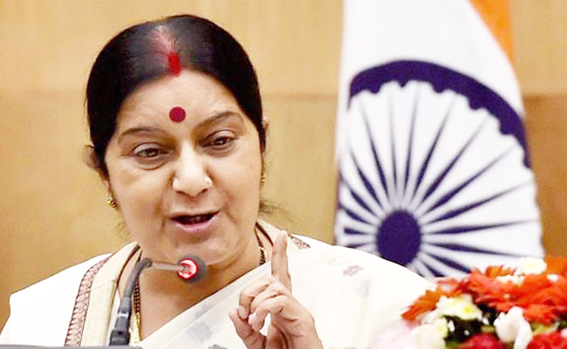NEW DELHI : Amid criticism that India failed to obtain consensus on reference to cross-border terrorism in BRICS declaration, External Affairs Minister Sushma Swaraj today said threat of terror featured strongly in the narrative of the Summit and there was a growing recognition that it has become a truly global challenge.
Two days after the BRICS Summit in Goa where India’s forcefully highlighted terror emanating from Pakistan, she said there was no bigger global challenge than “state- sponsored” and “state-protected terrorism, asserting those supporting terror networks must be made to pay the cost.
In clear reference to Pakistan, Swaraj said there is a need to extract costs from those who sponsor and support terrorists and provide them sanctuary and continue to make the “false distinction” between “good and bad terrorists”.
Swaraj was delivering an address at the BRICS media forum.
In an obvious reference to Pakistan blocking several pacts on transport and connectivity, Swaraj referred to growing cooperation on these issues among BIMSTEC nations, noting “There cannot be a greater contrast with those who reject even trade and connectivity for political reasons.”
On deliberations at the BRICS, Swaraj said while the economic engagement and political cooperation remained key factors, there was a sharp realisation that global development and prosperity was very much dependent on continued peace and security.
“Terrorism was universally recognised as a key threat to stability, progress and development. Consequently, it featured strongly in the conference narrative and its eventual outcome.
“Indeed, what we saw was not just an understanding of the dangers posed by terrorism to the economic aspirations of the world but a growing recognition that this has now become a truly global challenge that the international community can only ignore at its peril,” she said.
There was criticism of the government after consensus eluded on reference to cross-border terror in BRICS declaration.
Without naming any country, Swaraj said there has always been an overarching political context for the BRICS meetings which essentially underlines that a serious global discourse cannot be the “preserve” of a few countries with a “narrow agenda”.
“There is a developing consensus that it cannot be business as usual. We must be prepared to extract costs for those who sponsor and support terrorists, who provide them sanctuary, and who, despite their own claimed victimhood, continue to make the false distinction between good and bad terrorists.
“BRICS has always been global in its approach and today, there is no bigger global challenge than state-sponsored and state-protected terrorism,” she said.
Swaraj said members of BIMSTEC- Bhutan, Bangladesh, India, Nepal, Sri Lanka and Thailand – represented the “polar opposite” of a terrorism “promoting polity”.
“They are focused on improving the quality of life of their people, on skills and employment, on education and health, and on the quality of governance and the deepening of democracy.
“These are nations who are actively promoting connectivity, cooperation and contacts amongst themselves. Their interface with the BRICS has a message in itself. This is that a world changing in a positive direction as reflected by the BRICS has its regional expression in a community like BIMSTEC that is able to visualize a prosperous collective future,” Swaraj said
On India’s chairmanship of BRICS, Swaraj said “we took the BRICS outside the conference room and endeavoured to instill it in popular thinking.”
Talking about major initiatives by BRICS, she said the Summit represented a further advancement in terms of the breadth and focus of its discussions, adding the grouping has transformed over the years.
“Initially, its deliberations concentrated more on economic and financial issues. But over the years, it has broadened to cover larger global issues, even as it has promoted the creation of BRICS institutions and mechanisms.
“Key initiatives like a BRICS Rating Agency that can complement the New Development Bank, or the Railways Research Network and an Agriculture Research Platform that will allow us to leverage our specific strengths for mutual benefit are tangible goals that we believe can take the group forward,” she said.
Swaraj said a total of 115 events were organised in the nine months of India’s chairmanship of the bloc. (AGENCIES)
Trending Now
E-Paper


